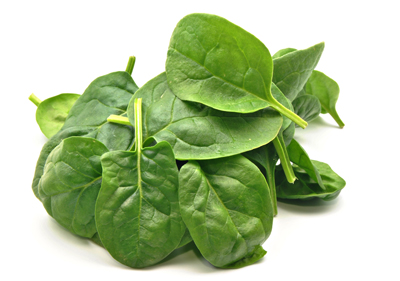
Health Benefits
When it comes to nutritious foods, spinach ranks pretty high on the list. Few sources offer more vitamin K than spinach. Vitamin K is essential for both blood clotting and bone health. Some research shows it may help decrease inflammation, a condition of many diseases, including Alzheimer's, arthritis, type 2 diabetes, osteoporosis, and heart disease. Spinach is also high in vitamins B6 and C, as well as folate and magnesium.
Buy
Look for strong, unwilted bright green leaves without slimy or dark spots. Buying from local growers will decrease the amount of time from farm to table. Spinach tends to taste best in the spring and fall, but don't let that stop you from reaping the benefits of this leafy green throughout the year.
Store
Wrap spinach in paper towels and store it in a plastic bag in your refrigerator's vegetable drawer. The paper towels will keep moisture away from the leaves, helping them to stay fresher longer. Whether you purchase prebagged or loose-leaf, spinach should last three to four days.
Prepare
Rinse leaves right before using, even if the spinach is labeled "prewashed." Trim the stems, then submerge in cold water and agitate to remove any stuck-on grit. Repeat until no grit is present. For crisp salad leaves, shake, gently pat or spin dry, wrap in paper towels and refrigerate for an hour or two. To benefit spinach's fat-soluble nutrients, cook the leaves with healthy fat, such as olive oil. Saute spinach with the oil and minced garlic over medium heat until wilted, 2 to 3 minutes. Serve with fresh lemon, squeezing a bit over the top for a boost in nutrients.
Did you know?
Credited with boosting spinach sales by 33 percent during its run was the fictional cartoon character, Popeye.
Read about the amazing health benefits of Sweet Potatoes.
